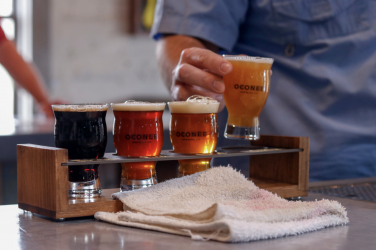
At X3 Sports training gym off of Milledge Avenue, participants in the Knock Out Parkinson’s Disease (or KOPD) class started their workout by calling out words that sounded like they belonged in a planetarium instead of a boxing gym.
“Evil aliens!”
“Friendship 7!”
“James Webb telescope!”
“Lunar!”
“Meteorite!”
This exercise is a cognitive game, meant to challenge participants by having them move their bodies while recalling words with a specific theme.
The category for this class was outer space, with boxing instructor Maura Cartwright leading the group through each letter of the alphabet while they did a warm-up exercise of stepping up and down off a raised platform. By combining mental and physical tasks, this themed game is designed to help individuals with Parkinson’s Disease (PD) effectively prepare their bodies for the exercise.
As the American population continues to age and the rate of PD increases each year, boxing gyms like X3 have stepped into the ring by offering specialized classes for those with neurodegenerative diseases.
The Science
According to the National Institute of Neurological Disorders and Stroke, PD is the second most common neurodegenerative disease in the United States after Alzheimer’s disease. The Parkinson’s Foundation estimates that nearly 1 million Americans have PD, and this number is expected to rise to 1.2 million by 2030.
While PD affects multiple parts of the brain, it is mainly characterized by decreasing the production of dopamine in the basal ganglia region, which controls complex movement and movement initiation, according to The National Library of Medicine. The loss of dopamine leads to both motor and cognitive function problems, such as an increase in tremors, slowed or rigid movements and a shuffling gait.

PD affects both the body’s ability to move and the cognitive function of the brain, leading to memory, attention and processing issues, as well as a decrease in neuroplasticity, the brain’s ability to adapt and take in new information. Scientists and doctors often recommend that PD patients exercise their minds and bodies to mitigate the symptoms of the disease.
“Exercise results in physiological benefits and changes,” said Phillip Tomporowski, University of Georgia kinesiology professor. “But with respect to changing cognition, it’s not just exercise. It’s what you’re doing while you’re exercising.”
The sport of boxing has grown in popularity as a treatment option for PD patients as it challenges participants physically and cognitively, often believed to decelerate the progression of PD symptoms such as involuntary movement and poor balance.
“Footwork in boxing is critical,” said Emory Department of Neurology Associate Professor Joe Nocera. “You know, being able to step, it challenges your base of support. It challenges your balance while you’re stepping and punching. And so now you’ve just introduced something exactly what Parkinson’s needs.”

Nocera is supportive of boxing as a means of managing PD, but he believes there are no workout methods considered to be the magic bullet for dealing with neurodegenerative disease symptoms. While Nocera often uses cycling when working with PD patients to minimize the risk of falling, he said he sees the need for patients to participate in sports with the added challenge of potential falls, as it gives them a more realistic scenario of day-to-day challenges they may face.
Ultimately, he believes the best form of exercise for an individual with PD is the one they enjoy doing, as it ensures they will remain consistent and fulfilled.
Studies by the National Institutes of Health have concluded that the more severe the PD is in an individual, the longer it will take to have noticeable improvements in PD symptoms following exercise.
Nocera argues that while there is a decrease in the brain’s adaptability in older adults, it is still possible to reverse and rewire the brain. He encourages those with PD to be lifelong learners and continue to pick up new hobbies because “it’s never too late.”
“There’s always a way to, kind of, hopefully, move the needle in somebody to impact the function that they do have,” said Nocera. “You want to maximize the function, whatever is left. Maximize that as much as possible.”
‘Fighting the Good Fight’
When Keppner Boxing & Fitness merged with X3 Sports in July 2024, the classes and clientele followed. The Keppner Boxing gym began offering KOPD classes in 2015, and Cartwright has been teaching the class since 2020.
While the KOPD classes share a similar curriculum to X3’s other boxing classes with regard to boxing technique and conditioning, Cartwright tailors the KOPD classes to the needs of her clients, such as focusing on exercises that support balance and posture.
“Balance is a big issue,” Cartwright said. “So I’ll take something we do, called ladder climbs, but we’ll slow it down. In a normal class, you would be repping it out, but with a Parkinson’s class, we’ll take our time, slow it down, really focus on the balance, or encourage bigger movements.”
Veronica Hunter was introduced to KOPD after suffering a stroke. She was skeptical about the pacing of the class, worried she may not be able to keep up. When she witnessed the accessibility of the class and the encouraging instruction from Cartwright, her fears dissipated.
“She’ll adapt whatever exercise it is,” said Hunter, “because we have some people, [such as one student that’s] in a wheelchair, and he does exercises with us. And she just adapts the exercise.”
Not only is the KOPD class designed to help strengthen the mind and body of the clientele, but it is also designed to foster community.
“You just get to be with people that have some problems like you do,” said Carol Gendron, a participant in the KOPD classes. “Don’t think that you can’t do it because you’re old or infirm. Try it. It’s great.”
Similarly to X3 Sports, D1 Training Athens offers triweekly classes for Parkinson’s patients. D1 is partnered with Rock Steady Boxing, a nonprofit organization that provides its affiliates with a fitness curriculum aimed at combatting the symptoms of PD through unique boxing techniques and exercises.
D1 is owned by Jon Richt, son of former UGA head football coach Mark Richt, and Fred Muzenmaier, a former UGA football player under Richt. After his diagnosis in 2021, Mark Richt turned his fight against Parkinson’s into a family affair with the help of his sister, Mikki Hynes, and her husband, Kevin “Chappy” Hynes.
“When he was diagnosed with Parkinson’s, he came to his sister, and we looked into all the remedies for Parkinson’s,” said Chappy Hynes. “We learned that they utilize boxing to assist in this fight on Parkinson’s.”
Mikki Hynes, a physical therapist and head coach of the Rock Steady classes at D1, said their curriculum focuses on mobility, balance and agility, utilizing core and cardio exercises intended to slow the mental and physical effects of PD.
Emily Bull, a client of Rock Steady and a Parkinson’s patient, has been attending classes at D1 for over a year. Bull said the exercises conducted during Rock Steady classes help mitigate her overall symptoms, specifically her balance, strength and coordination.
“I think one of the things that I’ve really noticed to help is the ‘sit-to-stands’, which is just basically a modified squat,” said Bull.
That helps me with getting out of chairs, getting up out of bed, getting off the toilet and all these things that I need a little more ‘umph’ to get up and go.”
When Bull first heard about the Rock Steady program, it took her time to muster the courage and attend one of the classes.
Now a regular participant, she has no regrets.
“I watched a class and there was such a sense of camaraderie,” said Bull. “I cried the whole time. There was such a sense of hope and community, and I was just really excited. I started here a couple of weeks later, and it’s been great ever since.”
Like Bull, Mikki and Chappy Hynes consider the camaraderie and teamwork fostered in their Rock Steady Boxing classes to be one of the major successes of the program.
“We’re not going to cure Parkinson’s,” said Chappy Hynes. “The main thing is, everyone has a place to come to and there is deep community here. We love each other really well. We encourage each other to keep fighting the good fight. And yeah, it’s really what it’s about.”
Neva Drane, Elizabeth Kim, Harper Covington and Jake Branan are journalism students at the University of Georgia.








Show Comments (1)
Donna K
I’m 75 and went on Carb/Lev about seven years ago three times a day along with Entacapone. Walking was real difficult. Dr. added PD-5 formula and I had immediate results with movement in my legs. Check out limitless health center